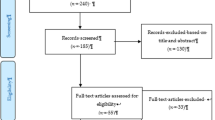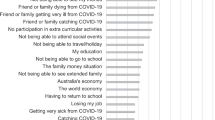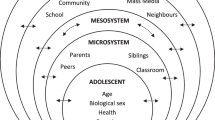Abstract
This study examined drug resistance strategies and substance use among adolescents from Monterrey, Mexico. The focus was strategies that U.S. adolescents use most often to resist using substances, including refuse (saying no), explain (declining with an explanation), avoid (staying away from situations where drugs are offered), and leave (exiting situations where drugs are offered). Using self-administered questionnaire data from a convenience sample of 327 Mexican students enrolled at two secondary schools (preparatorias), we tested whether frequent use of particular drug resistance strategies predicted actual substance use. Multiple regression results showed that different strategies were effective for different substances, that some effects were mediated by number of offers received, and that certain effects were stronger for females than for males. Students using the refuse strategy reported less cigarette use and less binge drinking; those using the avoid strategy reported less alcohol and cigarette use; and those using the leave strategy reported less binge drinking and, for females only, less marijuana use. Use of the explain strategy was not significantly related to substance use after controlling for use of other strategies. Findings are discussed in terms of Mexican cultural values and their implications for the design of prevention programs for Mexican youth. Editors’ Strategic Implications: Replication is necessary to evaluate some of the effects of sampling, the prevention model, implementation, and culture on these findings, but the study underscores the importance of recognizing and understanding the cultural context in which prevention programs—and the clients they serve—exist.
Similar content being viewed by others
References
Abdelrahman, A. I. (1998). The epidemiology of substance abuse among middle school students: The impact of school, familial, community, and individual risk factors. Journal of Child and Adolescent Substance Abuse, 8, 55–75.
Alberts, J. K., Hecht, M. L., Miller-Rassulo, M. A., & Krizek, R. L. (1992). The communicative process of drug resistance among high school students. Adolescence, 27, 203–226.
Alberts, J. K., Miller-Rassulo, M. A., & Hecht, M. L. (1991). A typology of drug resistance strategies. Journal of Applied Communication Research, 19, 129–151.
Amaro, H., Blake, S. M., Shwartz, P. M., & Flinchbaugh, L. J. (2001). Developing theory-based substance use prevention programs for young adolescent girls. Journal of Early Adolescence, 21, 256–293.
Berenzon, S., Villatoro, J., Medina-Mora, M. E., Fleiz, C., Alcantar-Molinar, E., Navarro, C. (1999). El consumo de tabaco de la población estudiantil de la cuidad de México [Consumption of tobacco among students of Mexico City]. Salud Mental, 22(4), 20–25.
Botvin, G. J., & Botvin, E. M. (1992). Adolescent tobacco, alcohol, and drug abuse: Prevention strategies, empirical findings, and assessment issues. Journal of Developmental and Behavioral Pediatrics, 13, 290–301.
Botvin, G. J., & Griffin, K. W. (2003). Drug abuse prevention curricula in schools. In Z. Sloboda & W. J. Bukoski (Eds.), Handbook of drug abuse prevention: Theory, science, and practice (pp. 45–69). New York: Kluwer.
Botvin, G. J., Griffin, K.W., Diaz, T., & Ifill-Williams, M. (2001). Preventing binge drinking during early adolescence: One-and two-year follow-up of a school-based preventive intervention. Psychology of Addictive Behaviors, 15, 360–365.
Botvin, G. J., Schinke, S. P., Epstein, J. A., & Diaz, T. (1994). Effectiveness of culturally focused and generic skills training approaches to alcohol and drug abuse prevention among minority youths. Psychology of Addictive Behaviors, 8, 116–127.
Caetano, R., & Medina-Mora, M. E. (1988). Acculturation and drinking among people of Mexican descent in Mexico and the United States. Journal of Studies of Alcohol, 49, 462–471.
Caraveo-Anduaga, J. J., Colmenares-Bermudez, E., & Saldivar-Hernandez, G. (1999). Diferencias por género en el consumo de alcohol en la Ciudad de México [Gender differences in alcohol consumption in Mexico City]. Salud Publica, 41(3), 177–188.
Castro, F. G., Proescholdbell, R. J., Abeita, L., & Rodriguez, D. (1999). Ethnic and cultural minority groups. In B. S. McCrady & E. E. Epstein (Eds.), Addictions: A comprehensive guidebook (pp. 499–526). New York: Oxford University Press.
Collier, M. J., Ribeau, S. A., & Hecht, M. L. (1986). Intracultural communication rules and outcomes within three domestic cultural groups. International Journal of Intercultural Relations, 10, 439–457.
Crick, N. R., & Dodge, K. A. (1994). A review and reformulation of social information-processing mechanisms in children’s social adjustment. Psychological Bulletin, 115, 74–101.
Dakof, G. A. (2000). Understanding gender differences in adolescent drug abuse: Issues of comorbidity and family functioning. Journal of Psychoactive Drugs, 32, 25–32.
Doi, S. C., & DiLorenzo, T. M. (1993). An evaluation of a tobacco use education-prevention program: A pilot study. Journal of Substance Abuse, 5, 73–78.
Epstein, J. A, Griffin, K. W., & Botvin, G. J. (2001). Risk taking and refusal assertiveness in a longitudinal model of alcohol use among inner-city adolescents. Prevention Science, 2, 193–200.
Felix-Ortiz, M., Villatoro-Velazquez, J. A., Medina-Mora, M. E., & Newcomb, M. D. (2001). Adolescent drug use in Mexico and among Mexican American adolescents in the United Status: Environmental influences and individual characteristics. Cultural Diversity and Ethnic Minority Psychology, 7(1), 27–46.
Gosin, M., Marsiglia, F. F., & Hecht, M. L. (2003). keepin’ it R.E.A.L.: A drug resistance curriculum tailored to the strengths and needs of pre-adolescents of the southwest. Journal of Drug Education, 33, 119–142.
Gottfredson, D. C., & Wilson, D. B. (2003). Characteristics of effective school-based substance abuse prevention. Prevention Science, 4, 27–38.
Griffin, K. W., Botvin, G. J., & Nichols, T. R. (2004a). Long-term follow-up effects of a school-based drug prevention program on adolescent risky driving. Prevention Science, 5, 207–212.
Griffin, K. W., Botvin, G. J., Nichols, T. R., & Scheier, L. M. (2004b). Low perceived chances for success in life and binge drinking among inner-city minority youth. Journal of Adolescent Health, 34, 501–507.
Griffin, K.W., Botvin, G.J., Scheier, L.M., Epstein, J.A., & Doyle, M.M. (2002). Personal competence skills, distress, and well-being as determinants of substance use in a predominately minority urban adolescent sample. Prevention Science, 3, 23–33.
Hecht, M. L., Alberts, J. K., & Miller-Rassulo, M. (1992). Resistance to drug offers among college students. The International Journal of the Addictions, 27, 995–1017.
Hecht, M. L., Corman, S. R., & Miller-Rassulo, M. (1993). An evaluation of the drug resistance project: A comparison of film versus live performance media. Health Communication, 5, 75–88.
Hecht, M. L., & Driscoll, G. (1994). A comparison of selected communication, social, situational, and individual factors associated with alcohol and other drugs. International Journal of the Addictions, 29, 1225–1243.
Hecht, M. L., Marsiglia, F. F., Elek, E., Wagstaff, D. A., Kulis, S., Dustman, P., & Miller-Day, M. (2003). Culturally grounded substance use prevention: An evaluation of the keepin’it R.E.A.L. curriculum. Prevention Science, 4, 233–248.
Hecht, M. L., Ribeau, S., & Alberts, J. K. (1989). An Afro-American perspective on interethnic communication. Communication Monographs, 56, 385–410.
Herrera-Vazquez, M., Wagner, F. A., Velasco-Mondragon, E., Borges, G., & Lazcano-Ponce, E. (2004). Incio en el consumo de alcohol y tabaco y transición a otras drogas en estudiantes de Morelos, México [Onset of alcohol and tobacco use and transition to other drug use among students from Morelos, Mexico]. Salud Publica Mexico, 46, 132–140.
Holland, T. P., & Kilpatrick, A. C. (1993). Using narrative techniques to enhance multicultural practice. Journal of Social Work Education, 29, 302–308.
Jackson, C., Henriksen, L., Dickinson, D., & Levine, D. W. (1997). The early use of alcohol and tobacco: Its relation to children’s competence and parent’s behavior. American Journal of Public Health, 87, 359–364.
Jernigan, D. H. (2001). Global status report: Alcohol and young people. Geneva: World Health Organization.
Kulis, S., Marsiglia, F. F., Elek, E., Dustman, P., Wagstaff, D. A., & Hecht, M. L. (2005). Mexican/Mexican American adolescents and keepin’ it REAL: An evidence-based substance use prevention program. Children and Schools, 27, 134–145.
Kulis, S., Yabiku, S. T., Marsiglia, F. F., Nieri, T., & Crossman, A. (2007). Differences by gender, ethnicity, and acculturation in the efficacy of the keepin’ it REAL model prevention program. Journal of Drug Education, 37, 123–144.
Latimer, W., Floyd, L. J., Kariis, T., Novotna, G., & O’Brien, M. (2004). Peer and sibling substance use: Predictors of substance use among adolescents in Mexico. Review of Panam Salud Publication, 15, 225–232.
Marsiglia, F. F., & Hecht, M. L. (2005). keepin’ it REAL: An evidence-based program. Santa Cruz, CA: ETR Associates.
Medina-Mora, M. E. (1994). Drinking and the oppression of women: The Mexican experience. Addiction, 89, 958–960.
Medina-Mora, M. E., Borges, G., Fleiz, C., Benjet, C., Rojas, E., Zambrano, J., Villatoro, J., & Aguilar-Gaxiola, S. (2006). Prevalence and correlates of drug use disorders in Mexico. Pan American Journal of Public Health, 19, 265–276.
Medina-Mora, M. E., Cravioto, P., Villatoro, J., Fleiz, C., Galvan-Castillo, F., & Tapia-Conyer, R. (2003). Consumo de drogas entre adolescentes: resultados de la Encuesta Nacional de Adicciones, 1998 [Consumption of drugs among adolescents: Results from the National Survey of Addictions 1998]. Salud Publica Mexico, 45, Supplement 1.
Medina-Mora, M. E., Natera, G., Borges, G., Cravioto, P., Fleiz, C., & Tapia-Conyer, R. (2001). Del siglo XX al tercer milenio. Las adicciones y la salud publica: Drogas, alcohol, y sociedad [From the 20th century to the third millennium. Addictions and public health: Drugs, alcohol, and society]. Salud Mental, 24(4), 3–19.
Medina-Mora, M. E., Peña-Corona, M. P., Cravioto, P., Villatoro, J., & Kuri, P. (2002). Del tabaco al uso de otras drogas: El uso temprano de tabaco aumenta la probabilidad de usar otras drogas? [From tobacco to the use of other drugs: Does early tobacco use increase the probability of using other drugs?] Salud Publica de Mexico, 44(1), S109–S115.
Medina-Mora, M. E., & Rojas Guiot, E. (2003). Mujer, pobreza, y adicciones [Women, poverty, and addictions]. Perinatologia y Reproducción Humana, 17, 230–244.
Miller, M., Alberts, J. K., Hecht, M. L., Krizek, R. L., & Trost, M. (2000). Adolescent relationships and drug abuse. New York: Erlbaum.
Moon, D. G., Hecht, M. L., Jackson, K. M., & Spellers, R. (1999). Ethnic and gender differences and similarities in adolescent drug use and the drug resistance process. Substance Use and Misuse, 34, 1059–1083.
Mora-Rios, J., & Natera, G. (2001). Expectativas, consumo de alcohol y problemas asociados en estudiantes universitarios de la ciudad de Mexico [Alcohol use expectancy, intake, and related problems among college students in Mexico City]. Salud Publica de Mexico, 43(2), 89–96.
National Center on Addiction and Substance Abuse. (2003). The formative years: Pathways to substance abuse among girls and young women ages 8–22. New York: Author.
Nuno-Gutierrez, B. L., & Flores-Palacios, F. (2004). La búsqueda de un mundo diferente. La representación social que determina la toma de decisiones en adolescentes Mexicanos usuarios de drogas ilegales [The search for a different world: Social representation that determines decision-making among Mexican adolescents using illegal drugs]. Salud Mental, 27, 26–34.
Ortiz, A., Soriano, A., Meza, D., Martinez, R., & Galván, J. (2006). Uso de sustancias entre hombres y mujeres, semejanzas y diferencias [Substance use among men and women: Similarities and differences]. Salud Mental, 29(5), 32–37.
Perea, A., & Slater, M. (1999). Power distance and collectivist/individualist strategies in alcohol warnings: Effects by gender and ethnicity. Journal of Health Communication, 4, 295–310.
Phinney, J. S., Ong, A., & Madden, T. (2000). Cultural values and intergenerational value discrepancies in immigrant and non-immigrant families. Child Development, 71, 528–539.
Reardon, K. (1989). The potential role of persuasion in adolescent AIDS prevention. In C. T. Salmon (Ed.), Information campaigns: Balancing social values and social change (pp. 273–289). Beverly Hills, CA: Sage.
Rodriquez, G. M., & Luis Villar, M. A. (2004). Estudio descriptivo del uso de drogas en adolescentes de educación superior de la Cuidad de Monterrey, Nueva León, México [Descriptive study of drug use among adolescents in higher middle education in Monterrey, Nuevo Leon, Mexico]. Revista Latino-Americana de Enfermagem, 12, 391–397.
Santillan, E. A., Fernandez, E., Hernandez-Avila, M., Tapia-Uribe, M., Cruz-Valdez, A., & Lazcano-Ponce, E. (2002). Prevalencía del tabaquismo y bajo desempeño escolar, en estudiantes de 11 a 24 años de edad del estado de Morelos, Mexico [Prevalence of tobacco use and low academic achievement in students 11–24 years old in the state of Morelos, Mexico]. Salud Publica de México, 44(5), S54–S66.
Scheier, L. M., Botvin, G. J., Diaz, T., & Griffin, K. W. (1999). Social skills, competence, and drug refusal efficacy as predictors of adolescent alcohol use. Journal of Drug Education, 29, 251–278.
Skara, S., & Sussman, S. (2003). A review of 25 long-term adolescent tobacco and other drug use prevention program evaluations. Preventive Medicine, 37, 451–474.
Spira, M. K., Grossman, S. F., & Wolff-Bensdorf, J. (2002). Voice and identity in a bicultural/bilingual environment. Child and Adolescent Social Work Journal, 19, 115–138.
Spitzberg, B. H., & Cupach, W. R. (1984). Interpersonal communication competence. Beverly Hills, CA: Sage.
Tapia-Conyer, R., Cravioto, P., de la Rosa, B., Galvan, F., & Medina-Mora, M. E. (2003). Historia natural del consumo de la cocaína: el caso de Ciudad Juárez, Chihuahua [Natural history of the use of cocaine: The case study of Ciudad Juarez, Chihuahua]. Salud Mental, 26, 12–21.
Tapia-Conyer, R., Kuri-Morales, P., & Hoy-Gutierrez, M. J. (2001). Panorama epidemiológico del tabaquismo en México [An epidemiologic overview of smoking in Mexico]. Salud Publica de Mexico, 43(5), 1–6.
Tobler, N. S., & Stratton, H. H. (1997). Effectiveness of school-based drug prevention programs: A meta-analysis of the research. Journal of Primary Prevention, 18, 71–128.
Vega, W. A., & Gill, A.G. (1998). Prevention implications and conclusions. In W. A. Vega & A. G. Gil (Eds.), Drug use and ethnicity in early adolescence (pp. 177–191). New York: Plenum Press.
Villareal, J., Medina-Mora, M. E., Amador, N., Bermudez, P., Hernandez, H., Fleiz, C. Gutiérrez, M., & Ramos, A. (2004). Consumo de drogas, alcohol y tabaco en estudiantes de México, D.F. [Drug, alcohol, and tobacco use among students in Mexico, Federal District]. Edición Otoño 2003, Report Global, INP-SEP [Fall 2003 Edition, Global Report of Mexican National Institute of Psychiatry-Secretariat of Education]. Mexico City: Mexican National Institute of Psychiatry-Secretariat of Education.
Villatoro, J., Hernández, I., Hernández, H., Fleiz, C., Blanco, S. & Medina-Mora, M. E. (2004). Encuestas de Consumo de Drogas de Estudiantes III [Survey of student drug use III]. 1991–2003 SEP-INPRFM. Disco Compacto. SEP- INPRF. México City: Mexican National Institute of Psychiatry-Secretariat of Education.
Villatoro, J. A., Medina-Mora, M. E., Hernandez, M., Fleiz, C., Amador, N., & Bermudez, P. (2005). La encuesta de estudiantes de nivel medio y medio superior de la ciudad de México: Noviembre 2003. Prevalencias y evolución del consumo de drogas [Survey of middle school and high school students in Mexico City: November 2003. The prevalence and evolution of drug use]. Salud Mental, 28(1), 38–51.
Villatoro, J. A., Medina-Mora, M. E., Juarez, F., Rojas, E., Carreno, S., & Berenzon, S. (1998). Drug use pathways among high school students of Mexico. Addiction, 93, 1577–1588.
Wagner, F., Gonzalez-Forteza, C., Aguilera, R. M., Ramos-Lira, L., Medina-Mora, M. E., & Anthony, J. C. (2003). Oportunidades de exposición al uso de drogas entre estudiantes de secundaria de la Ciudad de México [Opportunities to be exposed to the use of drugs among secondary students in Mexico City]. Salud Mental, 26, 22–32.
Wagner, F. A., Velasco-Mondragon, H. E., Herrera-Vazquez, M., Burges, G., & Lazcano-Ponce, E. (2005). Early alcohol or tobacco onset and transition to other drug use among students in the State of Morelos. Drug and Alcohol Dependence, 77(1), 93–96.
Wright, J., Nichols, T., Graber, J., Brooks-Gunn, J., & Botvin, G. J. (2004). It’s not what you say, it’s how many different ways you can say it: Links between divergent peer resistance skills and delinquency a year later. Journal of Adolescent Health, 35, 380–391.
Acknowledgment
This study was supported by National Institutes of Health/National Institute on Drug Abuse funding for the Southwest Interdisciplinary Research Center at Arizona State University (R-24 DA 13937-01), and a seed international research grant from the College of Public Programs at Arizona State University.
Author information
Authors and Affiliations
Corresponding author
Rights and permissions
About this article
Cite this article
Kulis, S., Marsiglia, F.F., Castillo, J. et al. Drug Resistance Strategies and Substance Use among Adolescents in Monterrey, Mexico. J Primary Prevent 29, 167–192 (2008). https://doi.org/10.1007/s10935-008-0128-x
Received:
Accepted:
Published:
Issue Date:
DOI: https://doi.org/10.1007/s10935-008-0128-x




